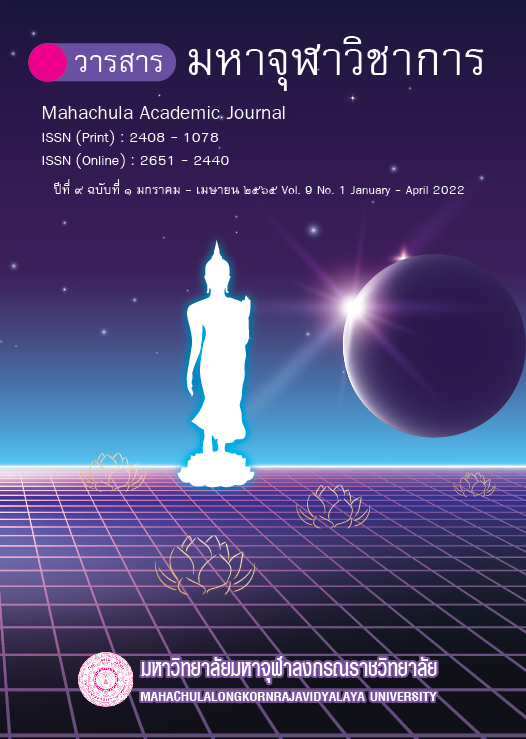Development of Leadership and Emotional Intelligence of Executives According to Buddhist Guidelines
Main Article Content
Abstract
In each organization, the executive is the most person who drive the organization to success. Especially in different ideas intelligence and emotional intelligence have relationship as a driving force that causes emotion to express both good and bad. The development of emotional intelligence on Buddhist Approach is on mindfulness. It helps to know oneself, self-examination, self-control, as well as being able to develop the qualities of a charitable mind to manifest and operate properly and appropriately in events. Emotional intelligence that enables executives and everyone work smoothly and successfully through the development of emotional intelligence according to the threefold principles are: 1) Physical development to keep the body healthy has a graceful personality, bright appearance, able to work well with the method of observing the precepts 5 2) Mental development for the mind to concentrate and considering the common principles the 3 corps are Impermanence, Dukkha, Anatta. Executives can put it into practice in order to succeed and be happy to work, Executives can think and consider in planning the operation as well as solving obstacles easily even more benefit and peace for oneself, organization and the whole sustainably.
Article Details

This work is licensed under a Creative Commons Attribution-NonCommercial-NoDerivatives 4.0 International License.
References
กรมสุขภาพจิต. คู่มือความฉลาดทางอารมณ์. กรุงเทพมหานคร : ชุมนุมสหกรณ์การเกษตรแห่งประเทศไทย, ๒๕๔๓.
พระพรหมคุณาภรณ์ (ป.อ. ปยุตโต). พจนานุกรมพุทธศาสตร์ ฉบับประมวลธรรม. พิมพ์ครั้งที่ ๑๗. กรุงเทพมมหานคร : โรงพิมพ์มหาจุฬาลงกรณราชวิทยาลัย, ๒๕๕๑.
วีระวัฒน์ ปันนิดานัย. “เชาวน์อารมณ์ (Emotional quotient - EQ) : ดัชนีวัดความสุขและความสำเร็จของชีวิต”. พิมพ์ครั้งที่ ๗ ฉบับปรับปรุง. กรุงเทพมหานคร : สำนักพิมพ์แห่งจุฬาลงกรณ์มหาวิทยาลัย, ๒๕๕๑.
อำนาจ บัวศิริ. “กระบวนการสร้างภาวะผู้น้ำด้วยหลักไตรสิขา”. วารสารครุศาสตร์ปริทรรศน์. ปีที่ ๕ ฉบับที่ ๓ (กันยายน – ธันวาคม ๒๕๖๑) : ๑ – ๓.
Daniel Goleman. Emotional Intelligence. New York : Bantam Books. 1995. Nancy Gibbs. “The EQ Factor” Time, 9 (October 1995) : 24 – 31.
นิเทศ สนั่นนารี. “การพัฒนาความฉลาดทางอารมณ์ตามแนวพุทธเพื่อความสำเร็จในการทำงาน”. [ออนไลน์]. แหล่งที่มา. : จาก KNATION BLOG. knation.nationtv/blog/mcukkpa/2018/08 [๒๙ มกราคม ๒๕๖๕].
พรรณี บุญประกอบ. “อีคิวในแนวทางพุทธศาสนา”. วารสารพฤติกรรมศาสตร์ ปีที่ ๕ ฉบับที่ ๑, หน้า ๗ – ๑๓. (เรียบเรียงจากการบรรยายพิเศษของพระราชวรมุนี (ประยูร ธมฺมจิตโต) แก่กองบรรณาธิการวารสารพฤติกรรมศาสตร์ ณ มหาวิทยาลัยมหาจุฬาลงกรณราชวิทยาลัย). [ออนไลน์]. แหล่งที่มา : http://bsris.swu.ac.th/journal/50842/file/52.pdf [๒๙ มกราคม ๒๕๖๕].
พระเจ้าบรมวงศ์เธอ พระองค์เจ้ากิติยากรวรลักษณ์กรมพระจันทบุรีนฤนาถ. (๒๔๗๐). พระไตรปิฎกภาษาไทย ฉบับสยามรัฐ. เล่มที่ ๑๐ พระสุตตันปิฎก เล่มที่ ๒ ทีฆนิกาย มหาวรรค มหาสติปัฏฐานสูตร ย่อหน้า ๒๓๗. [ออนไลน์]. แหล่งที่มา : http:// www.84000.org/tipitaka/pitaka_item/v.php?B=10&A=6257&Z=6764&pagebreak=0 [๒๙ มกราคม ๒๕๖๕].
พระพรหมบัณฑิต (ประยูร ธมฺมจิตโต). “กรรมฐานกับความฉลาดทางอารมณ์ (EQ)” บรรยายแก่นิสิตคณะสังคมศาสตร์ ปีที่ ๑ – ๔ มหาวิทยาลัยมหาจุฬาลงกรณราชวิทยาลัย โครงการปฏิบัติวิปัสสนากรรมฐาน ณ. มหาจุฬาอาศรม ตำบลพญาเย็น อำเภอปากช่อง จังหวัดนครราชสีมา เมื่อวันที่ ๑๖ ธันวาคม ๒๕๖๓. คลิกฟังเสียง/ดาวน์โหลดปาฐกถา. “กรรมฐานกับความฉลาดทางอารมณ์ (EQ)”. [ออนไลน์]. แหล่งที่มา: www.watprayoon.com/main.php?url=dhamma_view&id=2818&cat= D&dhamid=1 [๑๗ ธันวาคม ๒๕๖๔].


